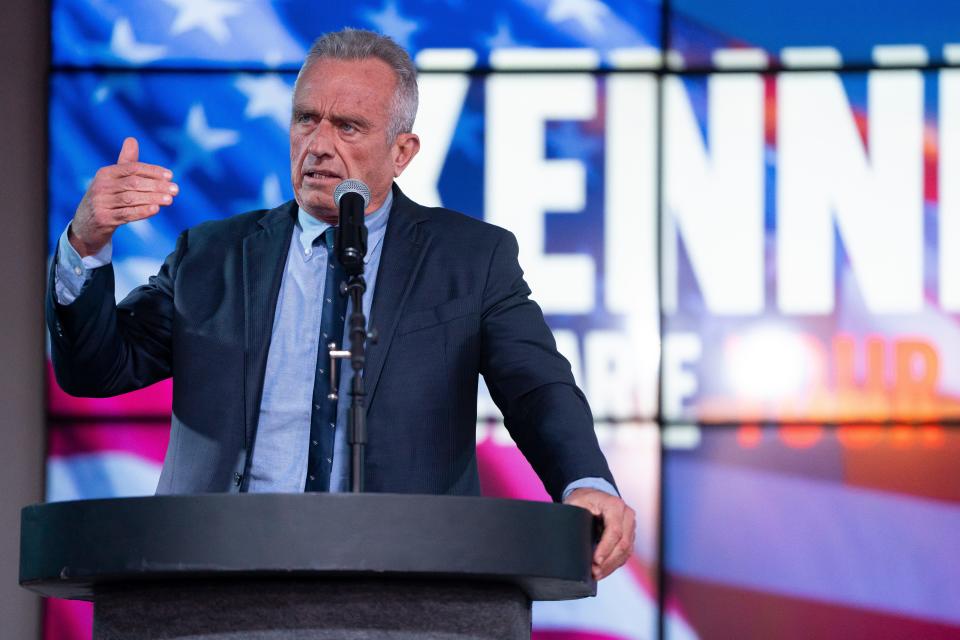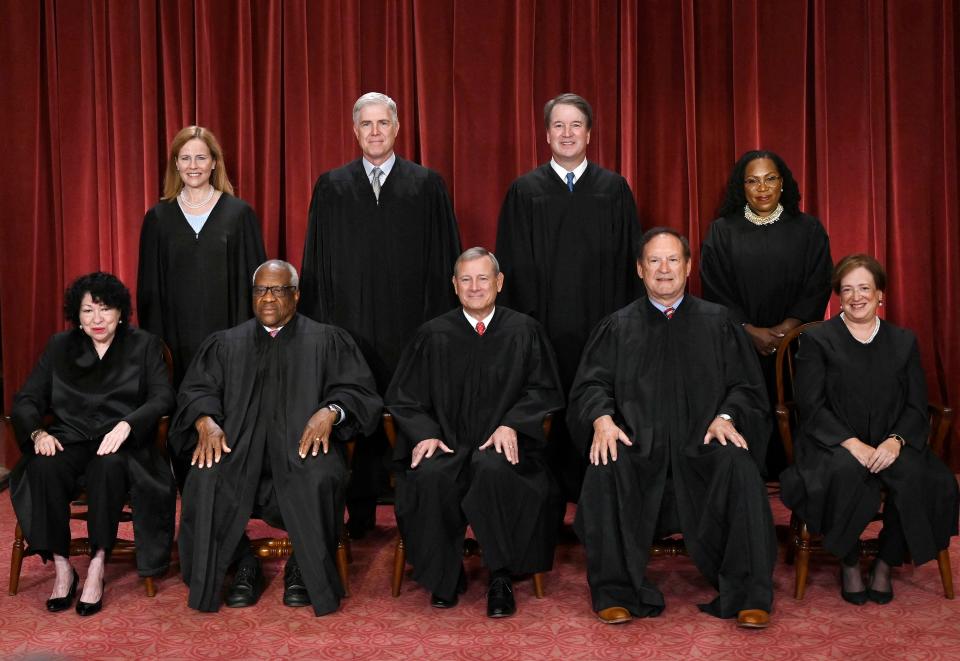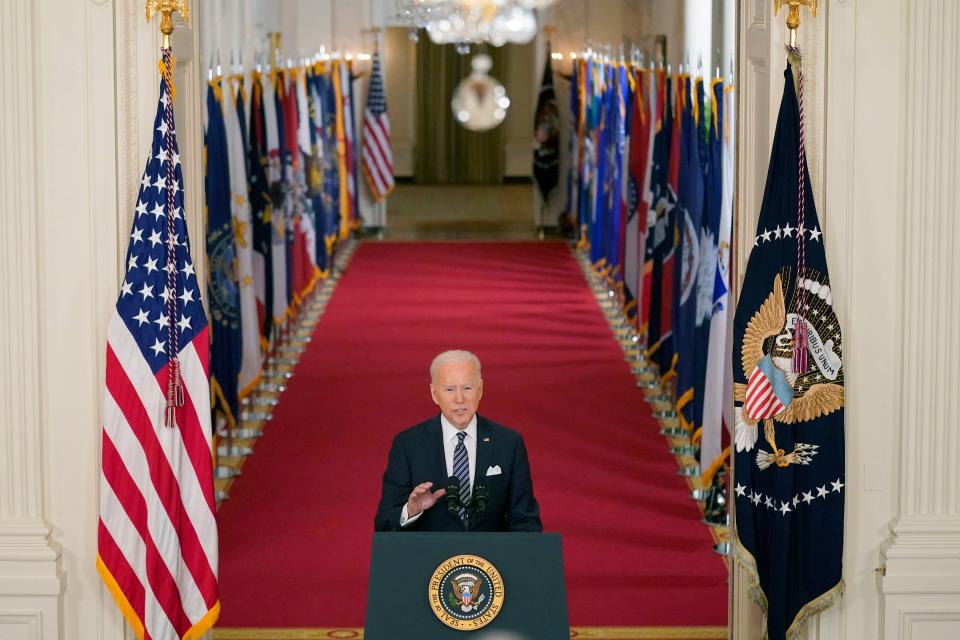Supreme Court to decide if White House went too far fighting social media misinformation
- Oops!Something went wrong.Please try again later.
WASHINGTON − After Robert F. Kennedy Jr. suggested without evidence that baseball legend Hank Aaron’s death in 2021 was caused by a COVID-19 vaccine, the Biden administration pounced.
“Wanted to flag the below tweet and am wondering if we can get moving on the process for having it removed ASAP,” the digital director for the White House’s COVID response team wrote in an email to an official at Twitter.
What the White House viewed as an effort to correct misinformation about a life-saving vaccine during a pandemic, critics called an example of a broad pressure campaign by the federal government to quash views it doesn’t like.
Now the Supreme Court is being asked what boundaries to set.

If the justices place too many restrictions on how the government can work with private social media companies in areas such as public health, election integrity and foreign interference, it could impede efforts to stop harmful misinformation, experts say.
But if there aren’t enough guardrails, the government – whether a Democratic or Republican administration – could have too much power to influence debate in a public square dominated by social media.
“I think we need to figure out how to draw these lines more carefully in ways that protect legitimate speech from government suppression,” said Brendan Nyhan, a political scientist at Dartmouth College who studies misperceptions about politics and health care. “But I'm concerned people are using that idea to try to shut down any kind of government information exchange with social media platforms, which I think could be harmful.”
Could the Supreme Court `destroy the internet'?
The Supreme Court takes up the issue Monday, three weeks after it heard challenges to laws passed by Florida and Texas to limit the ability of social media giants to regulate user content.
“This is the second major case in the last month in which the Supreme Court could destroy the internet, if it's not careful,” said James Grimmelmann, a professor of digital and information law at Cornell University. “They're unlikely to do that. But it's still a case in which they have to be very precise about what they say.”
Both cases grew out of concern from conservatives that their views were being suppressed about claims of 2020 election fraud, the origin of and treatments for COVID-19 and other issues, complaints that congressional Republicans have amplified with multiple hearings.

The GOP-controlled House last year passed legislation to prohibit federal employees from “advocating for censorship of viewpoints.” The bill, which has not advanced in the Democrat-controlled Senate, was a response to Twitter briefly blocking links to a New York Post story about Hunter Biden’s laptop in 2020.
Former Twitter executives denied last year that they were pressured by Democrats and law enforcement to suppress the story. Yoel Roth, Twitter's former head of trust and safety, who regularly communicated with the FBI about election security issues, testified at a congressional hearing that the agency was always careful “not to cross the line into advocating for Twitter to take any particular action.”
Lower courts sided with challengers
In the case before the Supreme Court Monday, Surgeon General Vivek Murthy and numerous other federal officials are being sued by the Republican attorney generals in Missouri and Louisiana and by five social media users who said their posts or accounts were removed or downgraded.
Kennedy, who is running for president as an independent and contends in a filing “there may be no more individual in the country more heavily targeted for social media censorship by the federal government,” has a separate suit still working its way through the court system.
One of the challengers being represented on Monday, Jill Hines, co-director of the conservative Health Freedom Louisiana group, said the warnings she received from Facebook included one for sharing a screenshot of a Kennedy tweet and one for her post of a Daily Mail story headlined, “Face masks may raise risk of stillbirths, testicular dysfunction and cognitive decline due to build-up of carbon dioxide, study warns.”
The study referenced included no evidence that masks cause serious health problems, according to PolitiFact, a nonpartisan factchecking site.

A district court in Louisiana sided with Hines and other challengers, imposing sweeping restrictions on the government’s interaction with social media platforms.
The New Orleans-based U.S. Court of Appeals for the 5th Circuit narrowed the restraints but the Justice Department said they would still place unprecedented limits on how government officials can speak about matters of public concern, address national security threats or relay public health information.
The restrictions are on hold while the Supreme Court reviews the case.
Three justices have already criticized `government censorship'
Three of the court’s six conservative justices –Samuel Alito, Clarence Thomas and Neil Gorsuch – wanted to reject the federal government’s appeal.
"Government censorship of private speech is antithetical to our democratic form of government, and therefore today’s decision is highly disturbing," Alito wrote when the court agreed to take the case.
The Justice Department argues public officials’ interaction with social media platforms was not coercive, nor did it involve “significant encouragement.” Government agencies “largely provided the platforms with information, leaving it up to the platforms to decide what action to take, if any,” the government’s lawyers wrote in a filing.
More: Mask mandates? Supreme Court rejects appeal from Marjorie Taylor Greene, GOP lawmakers
Lawyers for some of the challengers say that unless what’s being shared is illegal – such as child pornography – the First Amendment doesn’t allow the government to mediate “between true speech and false speech.”
“It's not the government's role, and never has been the government's role, to be the truth police,” said Mark Chenoweth, president and chief legal officer of the New Civil Liberties Alliance. The group represents the infectious disease experts who co-authored the Great Barrington Declaration, which advocated lifting COVID-19 restrictions on lower-risk groups to promote "herd immunity."
Persuasion or coercion?
The Knight First Amendment Institute at Columbia University said the Supreme Court needs to clarify the line between permissible persuasion and impermissible coercion – and must emphasize that applying that standard should include a full examination of the facts and context.
In Monday's case, for example, President Joe Biden’s public statement that social media companies were “killing people” by not sufficiently combatting misinformation about vaccines may have exerted public pressure but did not carry a retaliatory threat even if the word choice was provocative, according to the institute, which reviewed some of the charges.
The challengers’ objection to an internal email sent from a Biden COVID adviser to a Facebook official is trickier. Complaining that “100% of the questions I asked have never been answered and weeks have gone by,” the official wrote: “Internally we have been considering our options on what to do about it.”

The email sounded accusatory and demanding and could be read as an implicit threat of regulatory retaliation, according to the institute.
However the Supreme Court comes down in this case − and in its pending ruling on the Texas and Florida social media laws – the ramifications could be far-reaching.
Olivier Sylvain, an expert on communications law at Fordham University and a research fellow at the Knight First Amendment Institute, called it a “special, maybe even once in a generation, opportunity to define how far governments may go to protect against the online distribution of lawful and unlawful harmful content.”
Contributing: Bart Jansen, Jessica Guynn, John Kennedy of USA TODAY.
More: Supreme Court sounds skeptical of Texas and Florida laws to regulate social media
This article originally appeared on USA TODAY: Supreme Court social media case pits disinformation against censorship

